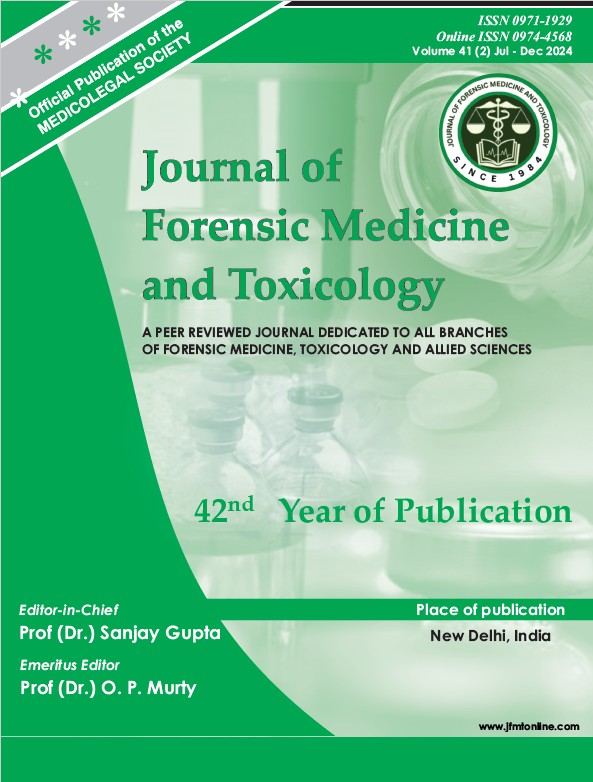IMPLEMENTATION OF INTEGRATED FORENSIC DATABASE INDIA - A NEED OF THE HOUR
Keywords:
forensic, analysis, LaboratoriesAbstract
Forensic Medicine, Forensic Science, and Toxicology have advanced significantly over the last few decades worldwide. Quality management in the context of forensic and analytical fields is an important aspect from the perspective of a state and the country for proper and timely disbursement of Justice. Forensic evidence analysis can affect the victim or accused’s life significantly. It can lead to criminal trials or civil trials, acceptance or denial of compensation, loss of job, loss of career, loss of health, children in custody, and others1,2,3. The quality of the forensic evidence shall meet or exceed the legal requirements as well as the scientific expectations in the court of law. On the other hand, it must be agreeable and flexible to the police, doctors, forensic experts, and forensic scientists for handling different body tissues and other articles related to a medicolegal case. After collection of the evidence and preservation of that maintaining the chain of custody, it is sent to the Forensic Science Laboratories for testing and report preparation. These reports are produced before the court of law as evidence to establish the facts scientifically. The documentation of activities and testimony based upon scientific facts plays a vital role in criminal justice system of any country.
Downloads
References
Ribaux O, Margot P. Inference structures for crime analysis and intelligence: The example of burglary using forensic science data. Forensic Science International 1999; 100(3):193–210.
Walsh SJ, Roux C, Ross A, Ribaux O, Buckleton JS. Forensic DNA Profiling - Beyond Identification. Law Enforcement Executive Forum 2002; 2(3):13–21.
Margot P. Forensic science on trial - What is the law of the land?. Australian Journal of Forensic Sciences 2011; 43(2–3):89–103.
Chen Y, Zheng J, Wu D, Zhang Y, Lin Y. Application of the PDCA cycle for standardized nursing management in a COVID-19 intensive care unit. Ann Palliat Med. 2020 May;9(3):1198-1205. doi: 10.21037/ apm-20-1084. PMID: 32498535
Bieber FR. Turning Base Hits into Earned Runs: Improving the Effectiveness of Forensic DNA Data Bank Programs. The Journal of Law, Medicine & Ethics 2006; 34(2): 222–233.
Rodriguez JJRB, Laude RP, Ungria MCA. An integrated system for forensic DNA testing of sexual assault cases in the Philippines. Forensic Science International: Synergy 2021; 3: 1-7 https://doi.org/ 10.1016/j.fsisyn.2021.100133
Rossy Q, Ioset S, Dessimoz D, Ribaux O. Integrating forensic information in a crime intelligence database. Forensic Science International 2013; 230(1–3): 137- 146.
Ribaux O, Walsh SJ, Margot P. The contribution of forensic science to crime analysis and investigation: forensic intelligence. Forensic Science International 2006;156(2–3): 171–181.
Lammers M, Bernasco W, Elffers H. How Long Do Offenders Escape Arrest? Using DNA Traces to Analyse when Serial Offenders Are Caught. Journal of Investigative Psychology and Offender Profiling 2012; 9(1):13–29.




